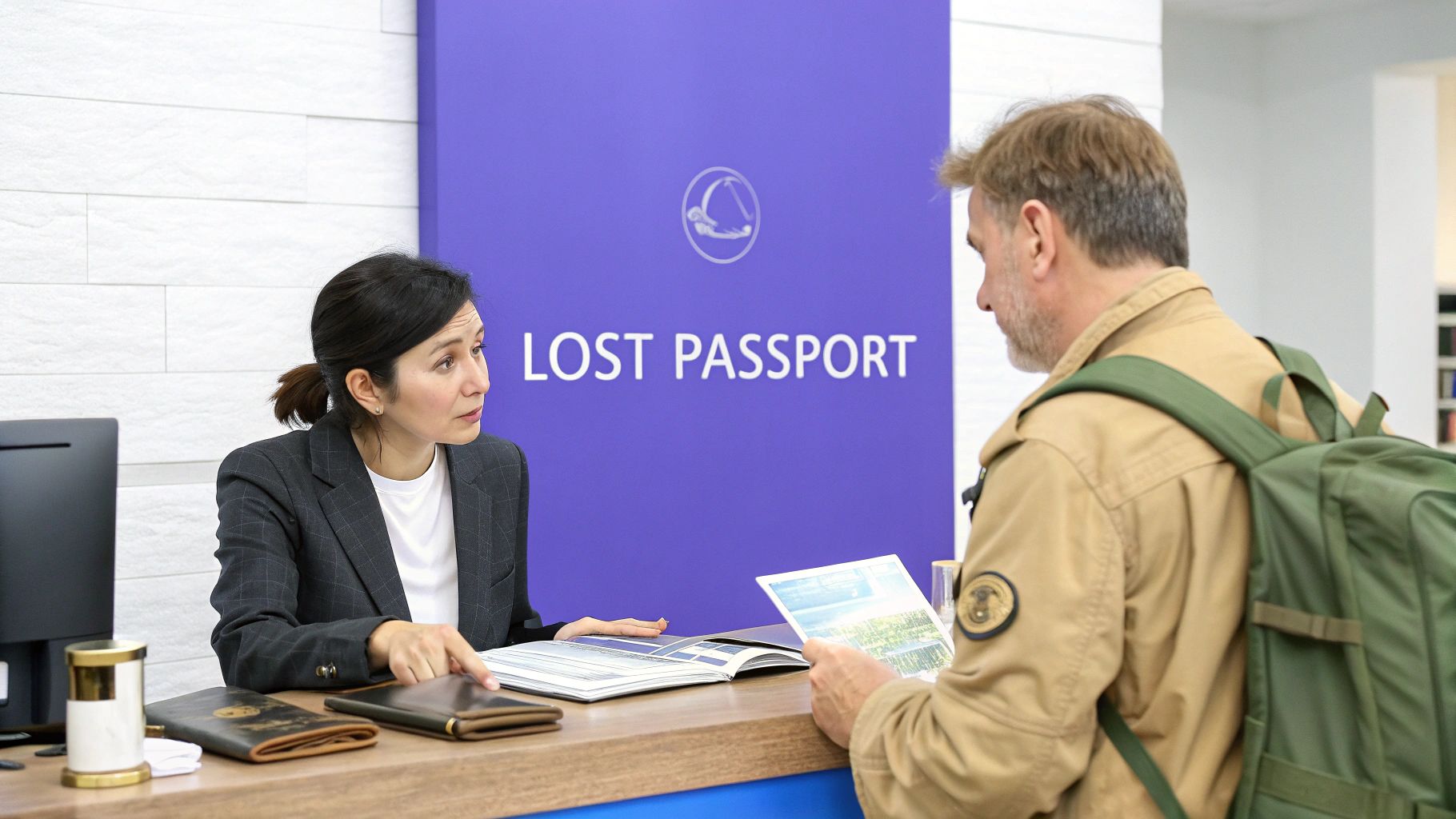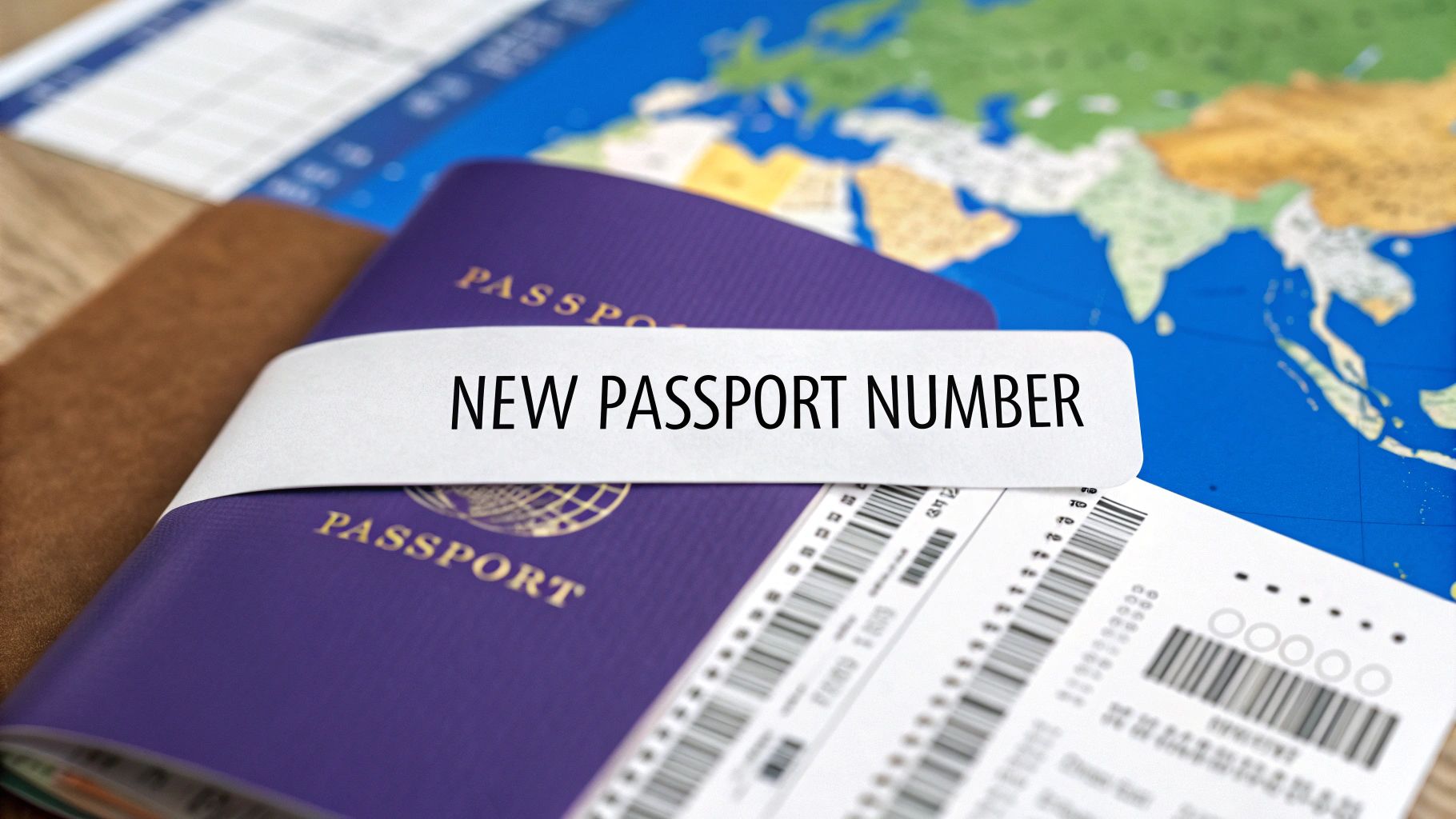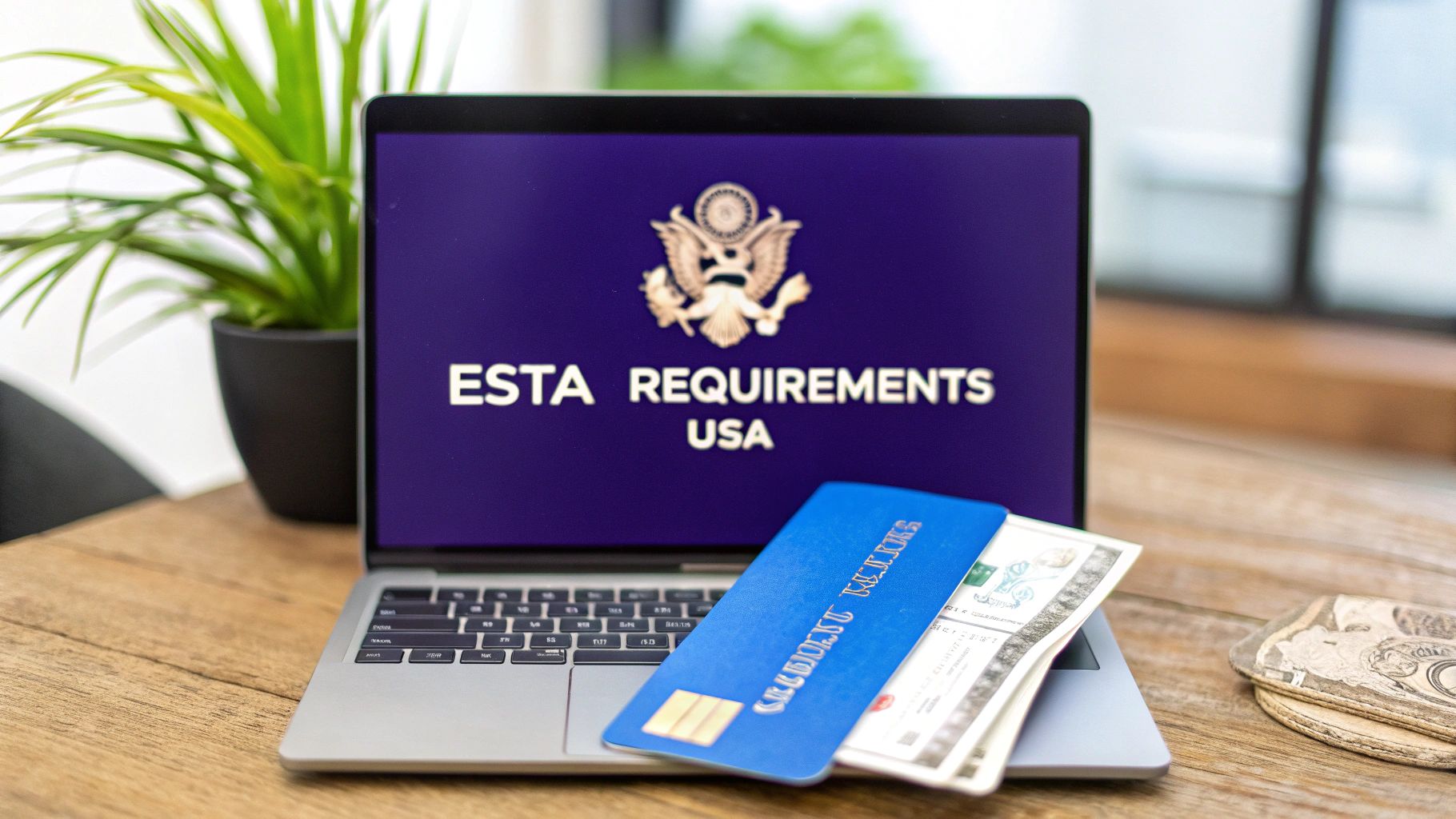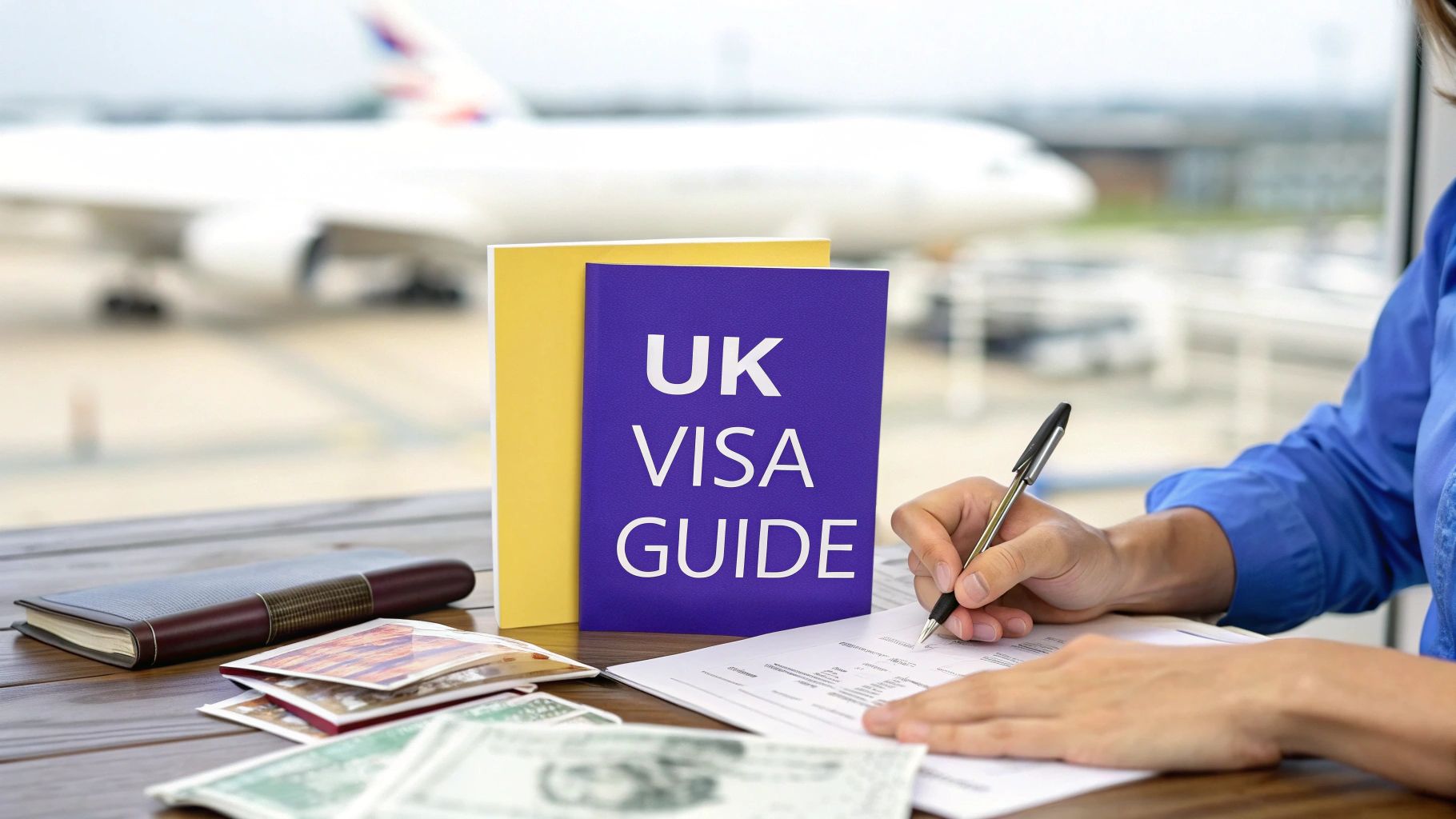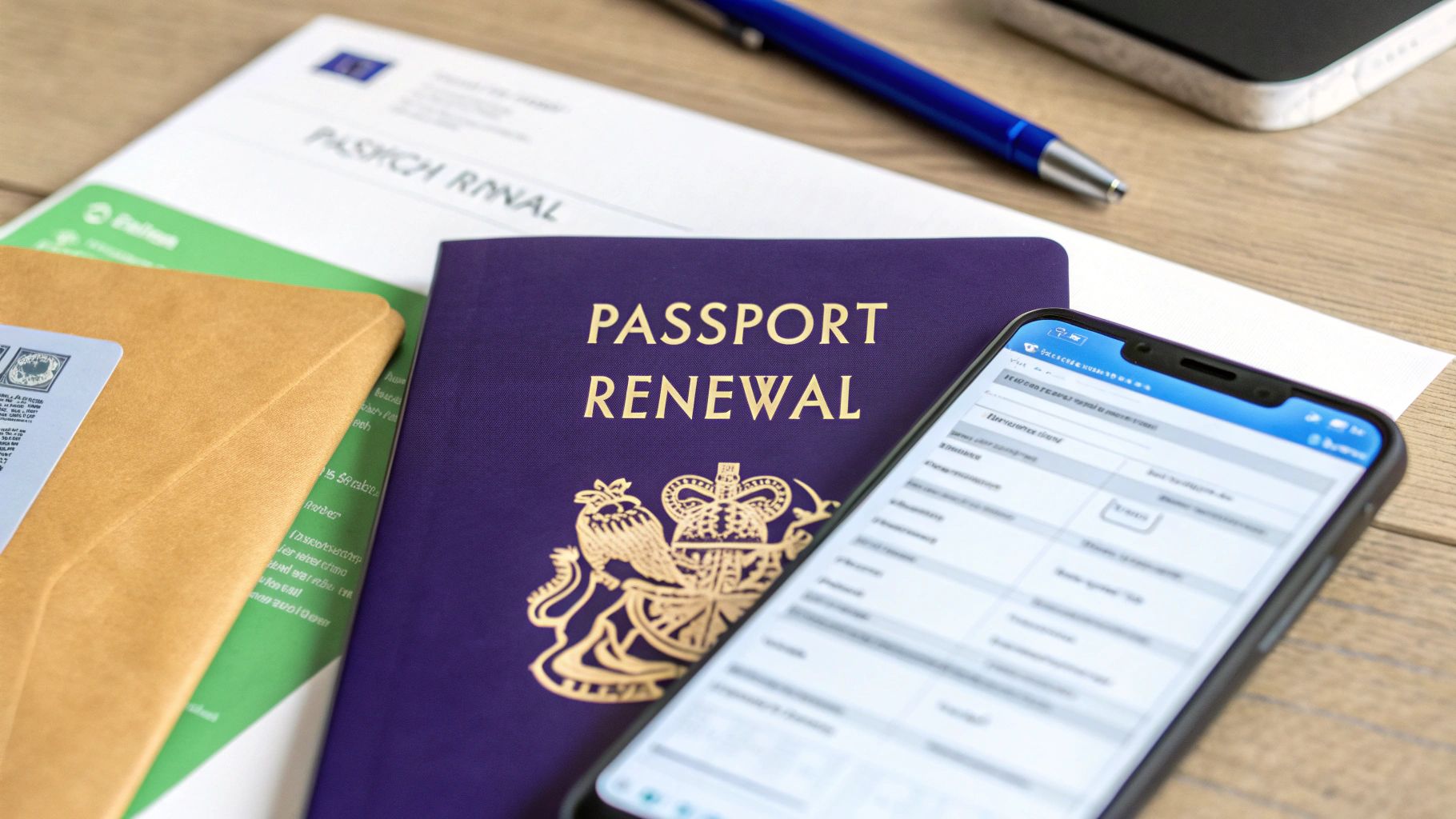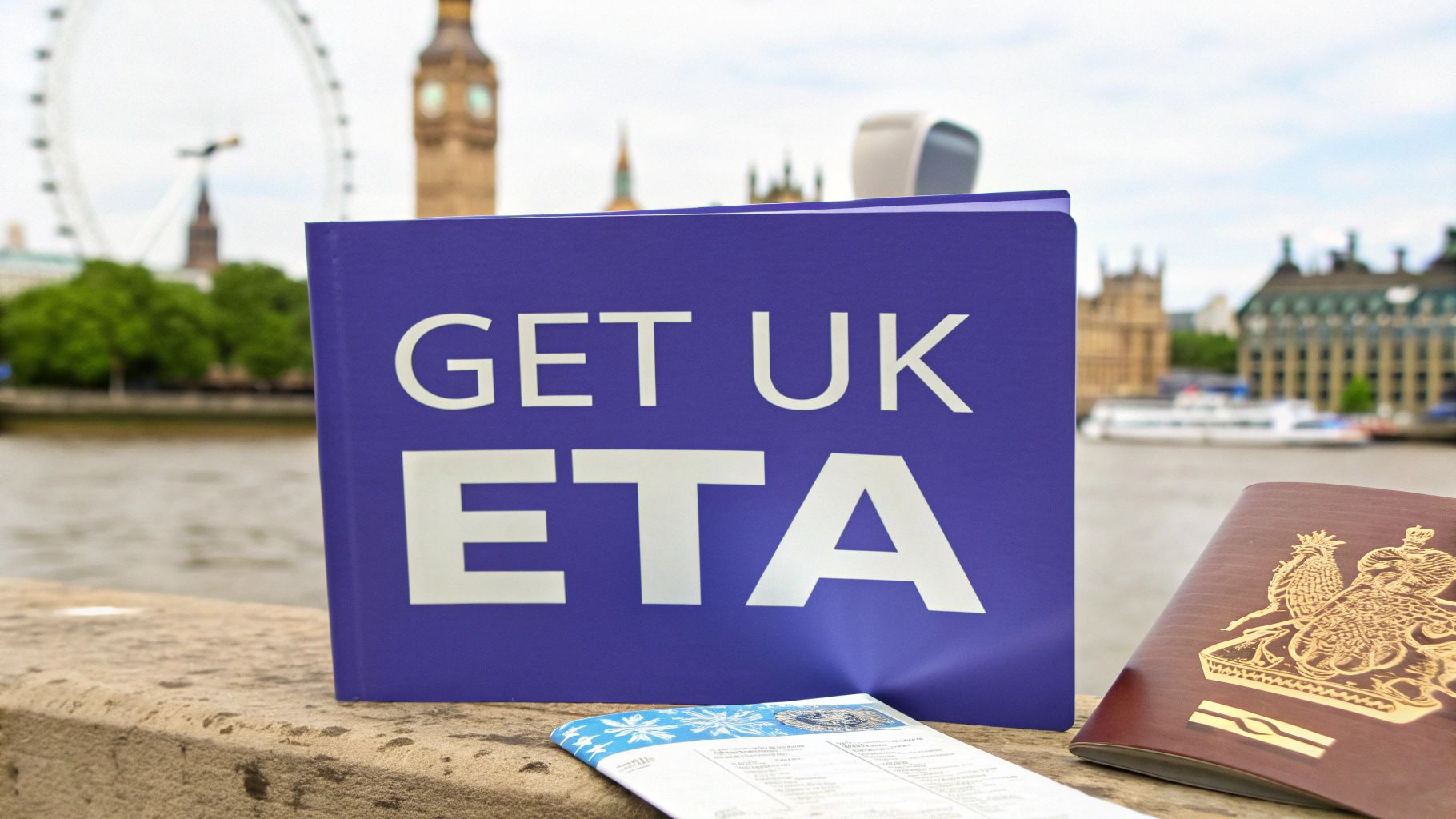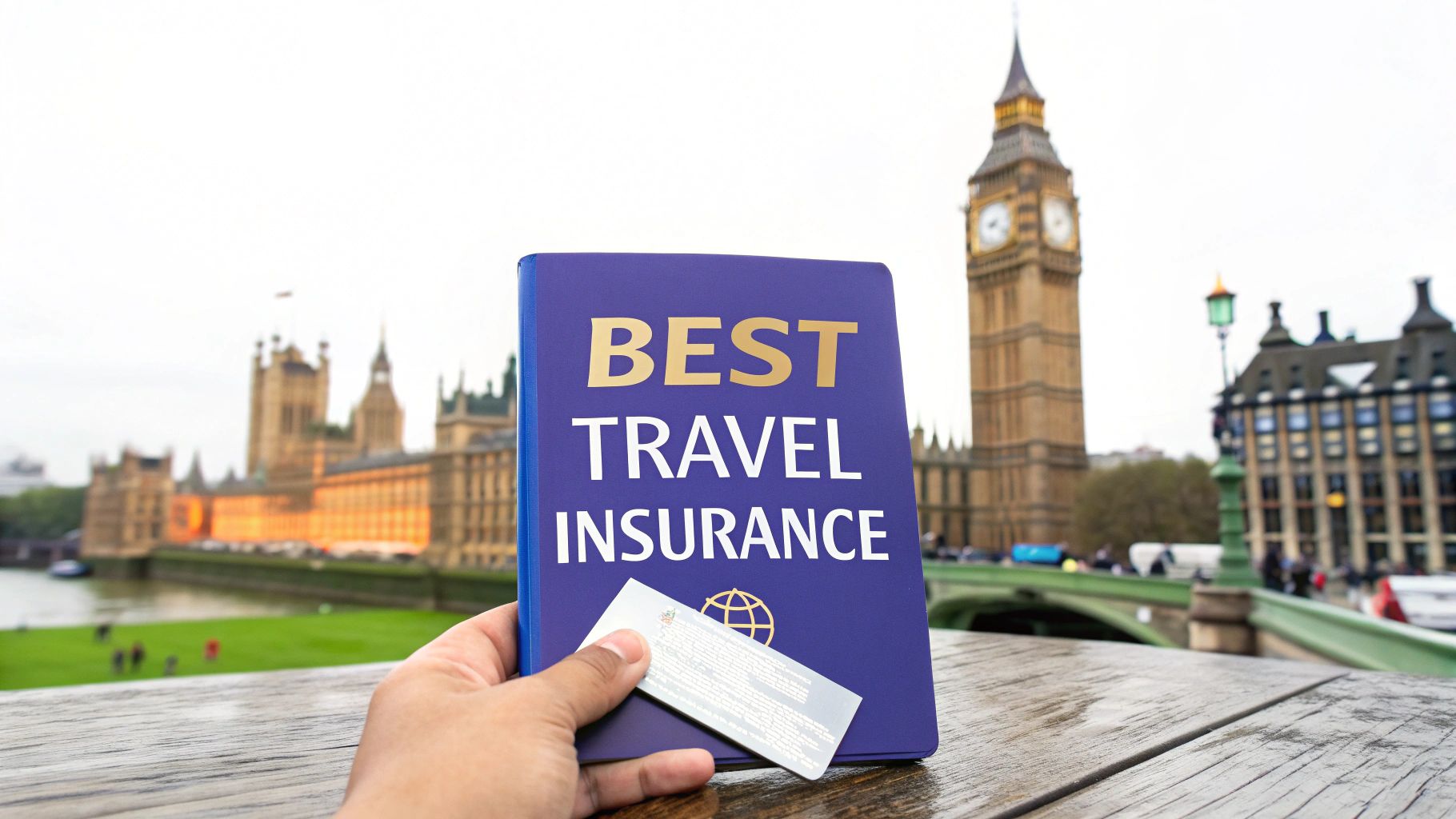
Best Travel Insurance for UK Trips
Finding the best travel insurance for your UK trip isn't just about ticking a box. It’s about getting a policy that provides solid medical coverage, thorough trip cancellation protection, and enough cover for your bags and belongings.
Ultimately, the right plan has to match your specific trip. Whether you're planning on hiking in the Scottish Highlands or hitting the museums in London, good insurance protects you financially when things don't go to plan.
Why Smart UK Travel Insurance Is A Non-Negotiable
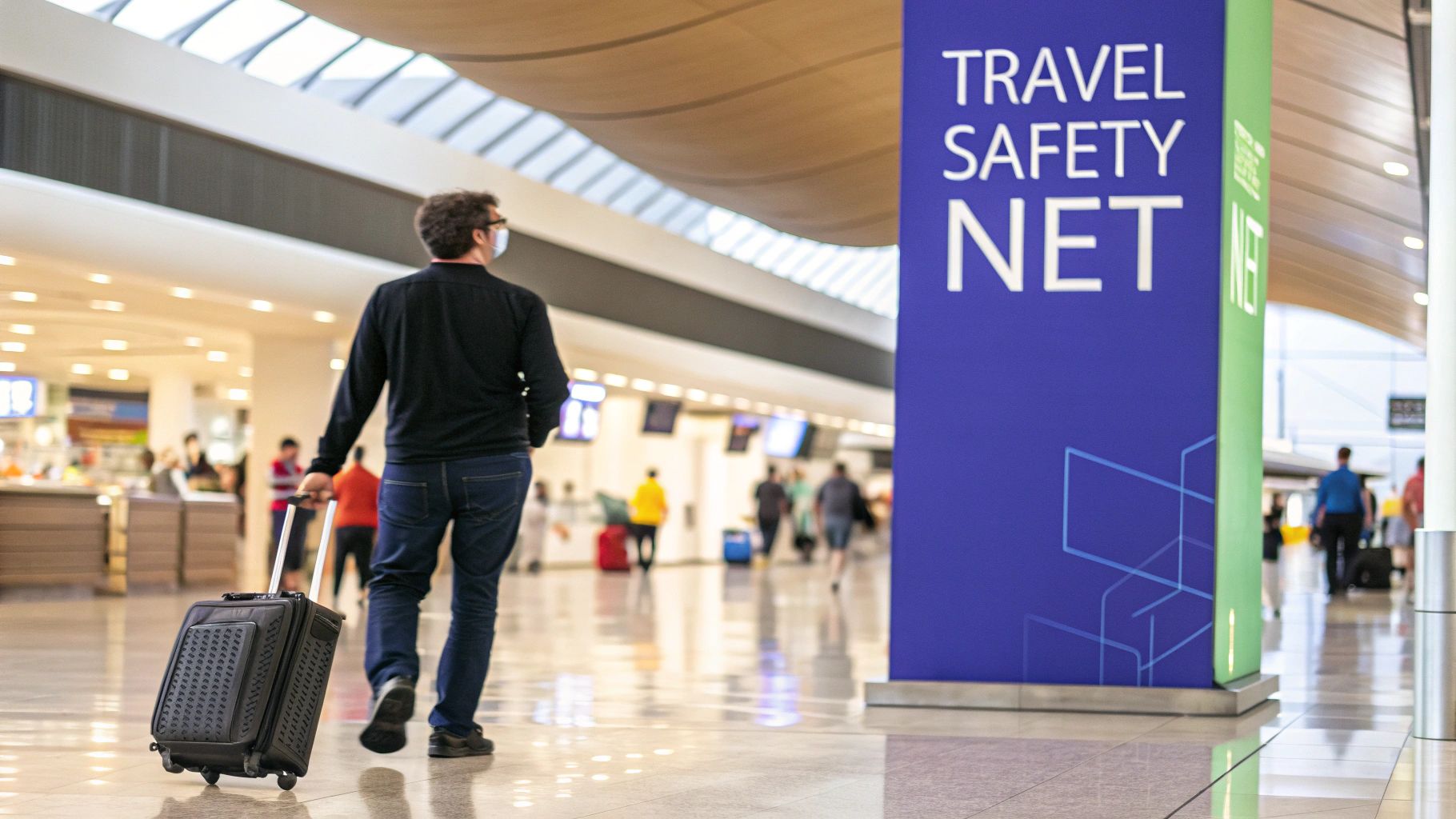
Putting together a trip to the United Kingdom is more than just booking flights and a place to stay. The right travel insurance policy is your financial safety net, shielding you from the kind of unexpected problems that can turn a dream holiday into a nightmare of bills and stress. This is about more than just basic cover; it’s about genuine peace of mind.
Imagine having to find a doctor as a non-resident after a sudden illness, or finding out your flight from Heathrow is cancelled because of the famously unpredictable British weather. These aren't wild what-ifs; they're real, common issues that travellers run into all the time. Without the right insurance, the costs can be eye-watering.
Keeping Up with Modern UK Travel Rules
Things have changed a bit for visitors to the UK. Post-Brexit rules and the new UK Electronic Travel Authorisation (ETA) system have added a few more steps to the process. It's not just about having your passport handy anymore.
The UK ETA is a new travel authorization for UK trips that visa-exempt nationals must obtain before travelling. A smooth UK ETA application process is a crucial first step for a stress-free journey.
More and more travellers are realising just how important this is. In fact, the UK travel insurance market is expected to grow from about USD 2.22 billion in 2025 to USD 4.21 billion by 2030. This boom is happening because travellers are more aware of the potential risks and see the value in having comprehensive private insurance.
The Core of a Great UK Travel Policy
A truly solid policy for your UK adventure will always have a few key things. Think of these as the non-negotiables that form the foundation of your protection.
- Comprehensive Medical Cover: This is essential. It should cover everything from emergency doctor visits and hospital stays to, in a worst-case scenario, getting you back home.
- Trip Cancellation and Interruption: Life happens. This protects the money you've invested if you have to cancel your trip beforehand or cut it short because of an emergency.
- Baggage and Personal Belongings: This reimburses you if your luggage gets lost, stolen, or damaged while you're on the move.
If you’re travelling with friends or family, it's worth looking into group travel insurance policies. They can often provide fantastic coverage for everyone while being more cost-effective.
When you know what to look for, you can pick a policy that gives you real security. It lets you dive into the UK's amazing history and culture without constantly worrying. The best travel insurance is the one that lets you focus on making memories, knowing you’re covered if something goes wrong.
Matching Your Insurance to Your UK Itinerary
Let's be honest: a generic, one-size-fits-all insurance policy is rarely the right fit for a trip to the UK. Your travel plans are unique, and your insurance should be too. The best policy is one that’s built around your specific trip—from the cities you’ll be wandering through to the adventures you have planned.
Think of it like packing. You wouldn't bring hiking boots for a week of museum-hopping in London, right? By the same token, you shouldn't pay for adventure sports coverage if your idea of a thrill is finding the perfect scone at afternoon tea. It all starts with a realistic look at your itinerary.
Figure Out Your Traveller Profile
First things first, who are you as a traveller? Are you a solo backpacker hopping between hostels, a family with young kids hitting the big historical sites, or a couple enjoying a quiet, luxury tour? Each of these profiles comes with its own set of risks.
A solo traveller might be more concerned about theft protection for their laptop and camera. A family needs solid medical coverage that applies to everyone, especially with unpredictable kid-related illnesses.
As you map out your UK journey, think through all the moving parts. For example, understanding key travel logistics like the closest airport to Bath, England helps you anticipate potential delays or cancellations that your insurance might need to cover.
Aligning Coverage with Your Activities
Your planned activities are a huge piece of the puzzle. A basic policy will probably do the trick for city breaks and museum tours, but it's not going to cut it if you're planning on hiking in the Scottish Highlands or coasteering along the Cornish coast.
- Low-Risk Fun: Most standard policies easily cover things like general sightseeing, museum visits, and casual city walks.
- Adventurous Outings: For anything more intense—think rock climbing, kayaking, or even guided cycling tours—you'll almost certainly need to look for an "adventure sports" add-on.
Don't forget about your gear, either. Quickly itemize your expensive electronics like laptops, cameras, and smartphones. If their total value goes over a standard policy's personal belongings limit (often just £500-£1,000), you’ll want to look into extra gadget cover.
This infographic gives a great visual breakdown of how what you pack should influence the policy you buy.
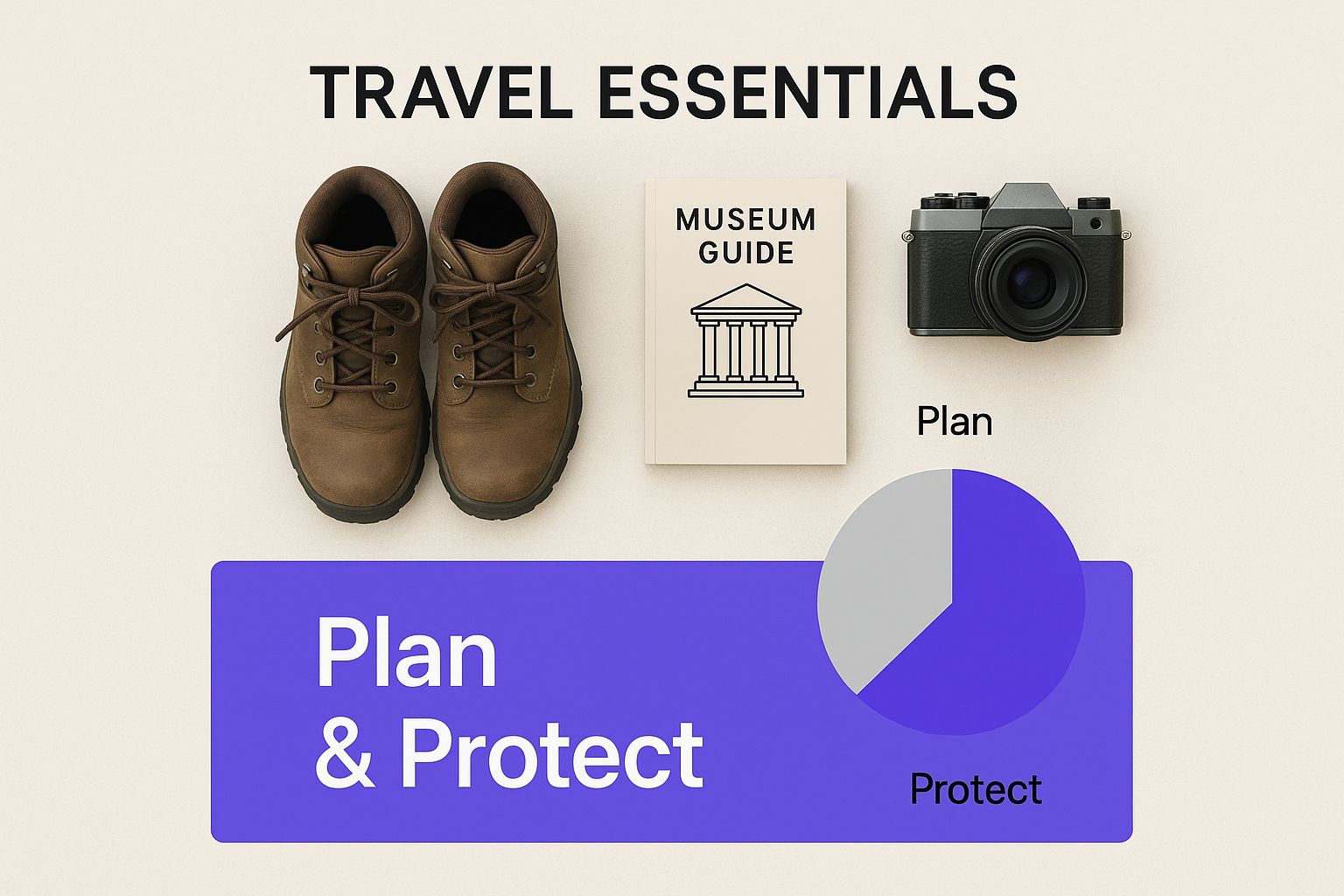
Whether it's hiking boots or a high-end camera in your bag, your gear is a clear indicator of the protection you actually need.
To make this easier, here’s a quick guide to help you match your travel style to the right kind of coverage.
Matching Your Travel Style to Insurance Coverage
| Traveller Profile | Primary Risks | Must-Have Coverage Features |
|---|---|---|
| The City Explorer | Petty theft, public transport delays, trip cancellations. | High personal belongings limit, travel delay cover, cancellation/interruption protection. |
| The Adventure Seeker | Injuries from activities, lost or damaged gear, emergency evacuation. | Adventure sports add-on, high medical emergency cover, gear protection. |
| The Family Vacationer | Child sickness, lost luggage for multiple people, rental car issues. | Family-specific plans, medical cover for all members, rental vehicle excess waiver. |
| The Luxury Traveller | Loss of high-value items, cancellation of expensive bookings. | High cancellation limits, high-value baggage cover, scheduled airline failure insurance. |
| The Backpacker | Hostel theft, unexpected itinerary changes, minor medical needs. | Basic medical, theft protection (especially for electronics), flexible trip interruption cover. |
Thinking through these scenarios helps you pinpoint exactly what matters most for your trip, so you’re not overpaying for bells and whistles you’ll never use.
It's also interesting to see how risk perception changes with age. Research shows that around 75% of seniors (65+) buy travel insurance, while less than 40% of young adults (18-24) do. It’s a clear reminder of how our personal circumstances shape the choices we make.
Ultimately, a policy that’s matched to your trip provides real peace of mind. Taking a few minutes now to align your insurance with your itinerary ensures you're only paying for what you need and are fully protected for the amazing trip you have planned.
Choosing Between Single Trip And Annual Policies
Deciding whether to pick a single-trip or an annual travel insurance plan really boils down to how often you jet off. Choose wisely, and you’ll not only have the right protection in place but could also pocket significant savings over the year.
A single-trip policy covers one holiday—from the moment you leave home to the moment you return. Think of it as a pay-as-you-go solution, perfect for that family break in London or a spontaneous Cotswolds escape. If you only travel once or twice each year, this is usually the most cost-effective option.
When A Single-Trip Policy Makes Sense
A single-trip plan shines when your travel is occasional or highly specific. Consider it if you fit any of these profiles:
- The Annual Vacationer: One big getaway per year keeps things simple.
- The Spontaneous Traveller: Last-minute city break? You can buy cover on demand.
- The Activity Specialist: Hiking Ben Nevis or sampling scotch distilleries in Scotland? Get a bespoke policy just for that adventure.
Industry data shows single-trip insurance claimed 60.49% of market revenue in 2024, a testament to its straightforward appeal. Yet, as travel habits shift, more people are exploring flexible annual options too.
The Value Of An Annual Multi-Trip Policy
On the flip side, an annual policy wraps every trip in a 12-month period under one umbrella. Business jaunts, family visits, weekend escapes—if you’re planning more than two or three UK or European trips, this often turns out cheaper and far more convenient.
Pro Tip: Do the math. Add up the cost of three single-trip policies. If an annual plan comes in lower, you’ve found your winner.
That said, always scan the small print. Annual plans usually cap any single trip at 31, 45, or 60 days, and some restrict the regions covered. Make sure the UK—and any side trips—fall within your policy’s boundaries.
Finally, don’t forget entry requirements. For example, many folks now ask Do I Need a UK Visa as a US Citizen? An annual policy means uninterrupted cover as you juggle visas, ETAs, and last-minute bookings all year long.
Navigating the New UK ETA Application
https://www.youtube.com/embed/zT1RBsQx7bM
Before you lock in that perfect travel insurance policy for your UK trip, there’s a new hurdle you need to clear. The UK has rolled out its Electronic Travel Authorisation (ETA), and it's a non-negotiable entry requirement for many travellers who don't need a visa.
Think of it as your digital permission slip to enter the country. You must have it before you even head to the airport.
Without an approved UK ETA electronically tied to your passport, you could find yourself turned away at the check-in desk. It's a trip-ender before your adventure even has a chance to start. This isn't just another piece of travel admin; it's a critical step for a smooth journey.
If you're from a visa-exempt country like the USA, Canada, or Australia, this new rule applies to you. It doesn't matter if you're coming for a holiday, a business meeting, or just passing through a UK airport on your way somewhere else—you'll need an ETA.
Why Expert Guidance Is a Smart Choice
The application is entirely online and looks simple enough, but the system is incredibly unforgiving. A tiny typo in your passport number, getting your date of birth wrong, or uploading a photo that doesn't meet the strict format can all lead to delays or a flat-out rejection.
These small mistakes can throw a huge wrench in your travel plans.
Waiting until the last minute is also a gamble you don't want to take. You need to apply and get that approval before you travel. This is where getting a bit of professional help can make all the difference.
To simplify your ETA application and increase your chances of approval, consider using AssistEntry — their experts guide you through the entire process, starting from just $79.
Using a trusted third-party application assistance provider like AssistEntry helps you sidestep all the common traps. They do more than just fill in the blanks on a form; they ensure every single detail is perfect before it's sent to the UK authorities.
Here’s what their service covers:
- Full verification of your application to make sure all your information is spot-on and matches your travel documents.
- Error-checking and compliance review to catch the little mistakes that automated systems often miss.
- Increased chances of approval, thanks to an expert-led, meticulously prepared submission.
Having an expert review your application dramatically improves your chances of getting approved on the first try. It takes the stress and guesswork out of the equation. While you focus on comparing insurance policies and planning your itinerary, a service like AssistEntry gets this critical entry requirement handled correctly from the get-go.
For a deeper dive, check out our complete guide on the ETA UK system, which covers all the requirements and eligibility details you'll need.
Decoding Policy Exclusions And Fine Print
Travel insurance isn’t just paperwork—it’s your safety net. Yet the biggest hurdle to a successful claim often lives in the fine print. Give yourself the time to read every clause before you hit “Buy.”
Many travellers overlook how an undeclared health issue can wreck their cover. Even something as common as high blood pressure needs to be flagged at application. Otherwise, you risk losing all medical protection when you need it most.
Common Exclusions And Red Flags
Policies love to hide limits in plain sight. Spotting these early will save you pain later on.
Here’s a quick overview of what tends to trip people up:
“Reading your policy with a critical eye—and asking questions—means you won’t be left in the lurch when an emergency strikes.”
Common Travel Insurance Exclusions To Watch For
A closer look at typical exclusions and how you can stay covered.
| Exclusion Category | What It Typically Means | Action To Take |
|---|---|---|
| Pre-Existing Medical Conditions | Any illness or injury you had before buying the policy. | Declare everything—even minor issues—during application. |
| High-Risk Activities | No cover for things like rock climbing or extreme water sports. | Add an “adventure sports” extension or choose specialist cover. |
| Alcohol- or Drug-Related Incidents | Claims denied if you’re under the influence during an accident. | Stay sober when participating in insured activities. |
| Travelling Against Official Advice | No protection if you ignore government warnings or travel bans. | Check FCDO travel advice and adjust plans accordingly. |
| Epidemics & Pandemics | Some policies exclude losses due to outbreaks or government closures. | Look for pandemic cover or separate trip-cancellation insurance. |
Even the best policy isn’t bulletproof. That’s why it pays to talk directly with your insurer about anything that feels vague or risky.
Navigating Entry Requirements
Insurance isn’t the only box to tick. The UK ETA application has become a must for many visa-exempt visitors. A typo or missing detail here can mean refusal at the border—and a headache when claiming trip cancellation.
If you’d rather skip the guesswork, AssistEntry offers expert support from $79. Their team double-checks every form, so you can focus on packing—not paperwork.
A Step-by-Step Guide to Making a Claim
Knowing what to do when something goes wrong is the key to managing a stressful situation while you're travelling. Having the best travel insurance for UK trips is only half the battle—the other half is understanding exactly how to use it when you need it most.
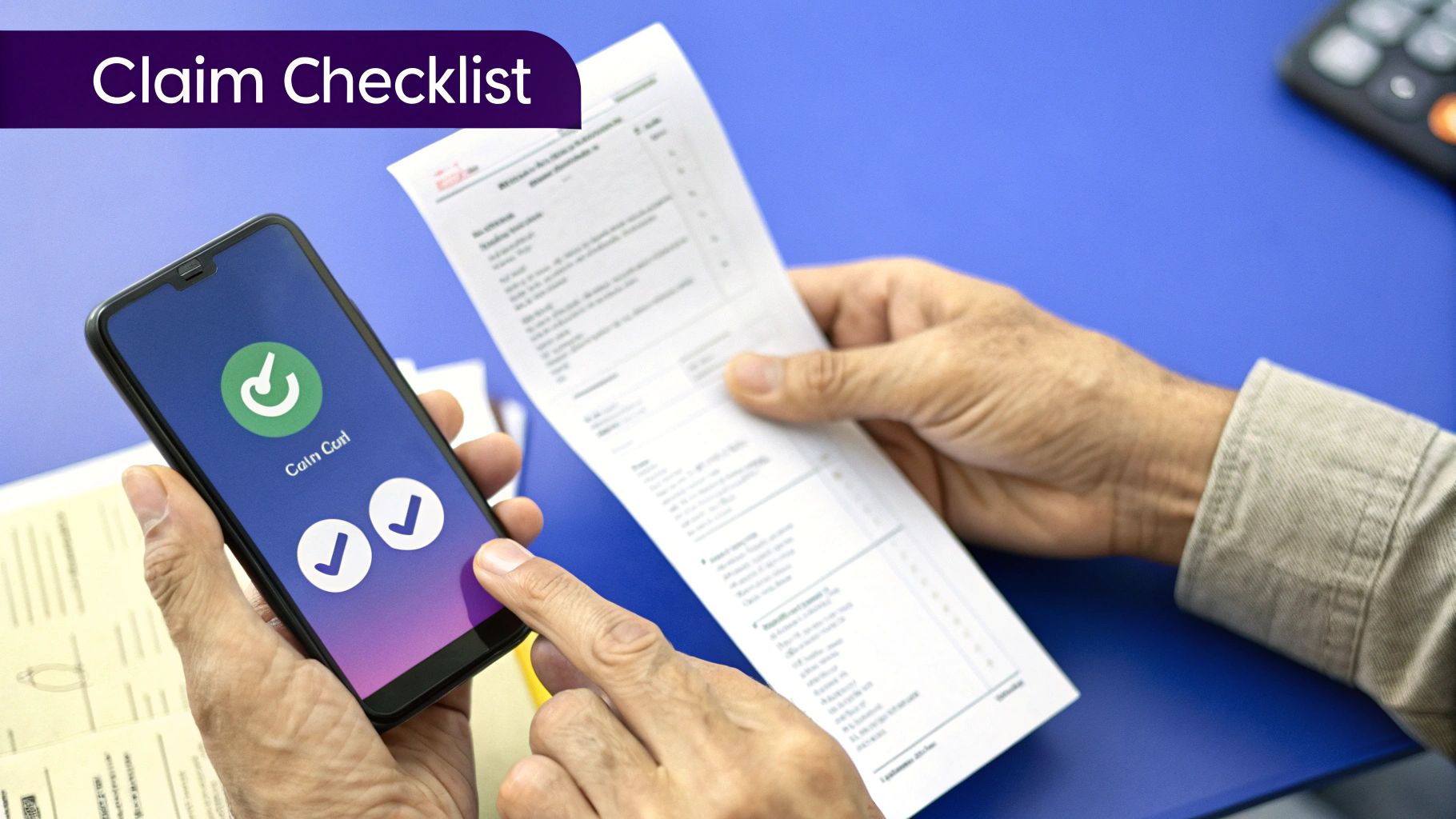
Your very first move in any serious incident, whether it's medical or something else, should always be to contact your insurer’s 24/7 emergency assistance line.
This number will be on your policy documents. Do yourself a favour and save it to your phone before you even leave home. They'll guide you on which medical providers are authorised and what your next steps should be, which is absolutely critical for getting your claim approved.
Document Everything Immediately
From that moment on, your priority becomes gathering evidence. It's simple: insurers operate on proof, so you need to be meticulous with your record-keeping.
Here's what you'll need:
- For medical issues: Keep every single receipt, doctor’s note, and prescription. No exceptions.
- For theft or loss: You must file a police report within 24 hours and get a written copy of it.
- For travel delays: Get written confirmation from the airline or transport provider that clearly states the reason for the delay and exactly how long it was.
My best advice? Take clear photos of all your documents with your phone as you get them. This creates an instant digital backup and makes the online submission process so much smoother later on. It’s also wise to keep a log of every phone call, noting the date, time, and the name of the person you spoke with.
This little bit of preparation can make all the difference, ensuring a seamless claims process and letting you get the support you paid for without any unnecessary hassle.
Frequently Asked Questions
Here are quick answers to some of the most common questions about UK travel insurance and entry requirements, so you can hit the ground running.
Do I Need Travel Insurance If I Have A GHIC Card
A Global Health Insurance Card (GHIC) covers emergency state healthcare only within the EU. It won’t help you in the UK.
You’ll want a solid travel insurance plan that includes:
- Private medical cover and repatriation
- Trip cancellation and interruption
- Lost, stolen, or delayed baggage
When Should I Buy My UK Travel Insurance
Lock in your policy as soon as your trip is booked. That way, cancellation cover kicks in immediately.
If you fall ill or face an emergency before departure, you’re protected—no last-minute scramble required.
How Do The UK ETA And Travel Insurance Work Together
Think of the UK Electronic Travel Authorisation (ETA) and travel insurance as two sides of the same coin:
- ETA: Mandatory digital entry pass
- Insurance: Financial safety net on the road
A hiccup in your ETA application could lead to entry delays—and that might complicate any claims you make later. For a step-by-step walkthrough, you can learn how to check your visa application status.
A seamless ETA approval paves the way for hassle-free travel and smooth insurance claims.
To make life easier, consider bringing in the experts. AssistEntry, a third-party application assistance provider, reviews every detail of your UK ETA form, flags mistakes, and guides you through submission. Plans start at $79, including government fees. Apply confidently at AssistEntry’s UK ETA page.
